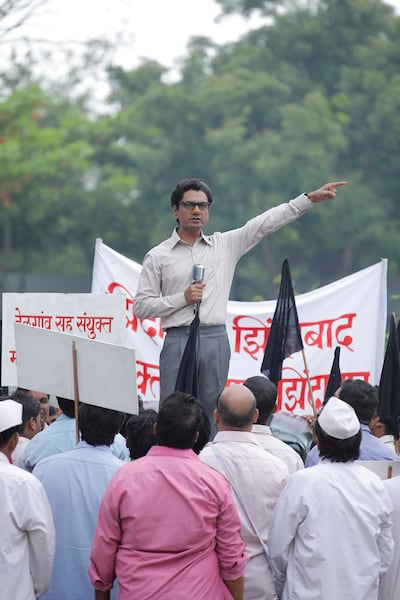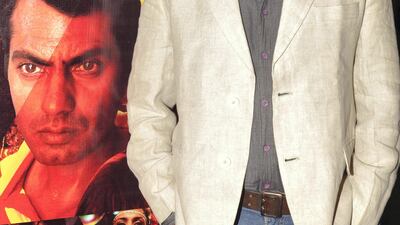Nawazuddin Siddiqui was never meant to be a hero, or even a Bollywood actor for that matter. "I knew what stared back at me in the mirror," he said in an interview with GQ soon after the success of his breakthrough, two-part film, Gangs of Wasseypur, directed by Anurag Kashyap in 2012. Bollywood, and India, were finally taking note of the powerhouse of talent hiding behind Siddiqui's vaguely familiar face – we knew we'd seen him, but it was difficult to place where.
Despite the recognition that was starting to come his way, Siddiqui had his feet firmly planted on the ground with an iron-clad grasp on reality that few in show business find themselves capable of holding on to when success comes knocking.
Siddiqui, of course, had good reason for the cut and dry, pragmatic-bordering-on-cynical, approach to his work. He had been playing uncredited, no name roles for well over a decade before Gangs of Wasseypur. He was the diminutive, dark, painfully skinny talented junior artist who casting agents called when they needed pickpockets, waiters, sorry-looking terrorists, goons and an assortment of blink-and-you'll-miss-it cameo roles. Cut to seven years later and Siddiqui is one of the most bankable names in Bollywood, having cemented his image as a pin-up for independent and alternate cinema.
The past few years have been particularly rewarding. Last year, his portrayal of controversial and conflicted Indian-Pakistani writer Saadat Hasan Manto, in Nandita Das's Manto, wowed critics and audiences alike and won him Best Performance by an Actor at the Asia Pacific Screen Awards. It was also the year he made his Netflix debut as one of the lead characters in Sacred Games, the streaming service's first original series from India.
Such recognition had been a long time coming for Siddiqui. The Lunchbox, 2013's sleeper hit in which he played a supporting role, was a resounding success and so well-loved by the audience that when it wasn't submitted as India's official entry to the Foreign Language Film category at the 2014 Oscars, it sparked quite a controversy, fuelled by its crew's outrage.

Nevertheless the following year was all about thrillers for Siddiqui. Both Badlapur and Raman Raghav 2.0 received rave reviews, with the latter doing the rounds of major international film festivals including the Cannes Film Festival, Sydney Film Festival and Singapore International Film Festival. In 2016, he played a supporting role in Lion, the film starring Dev Patel and Nicole Kidman that was nominated for six Oscars. The year after, he won the Best Supporting Actor award at the International Indian Film Academy Awards for his role as a detective in the crime thriller Mom.
This year, Siddiqui started on a high note. His portrayal of Balasaheb Thackeray, founder of Hindu right-wing political party Shiv Sena, in Thackeray, was praised by critics countrywide and loved by movie-goers, despite the controversial politics of its titular character. And this weekend, we finally get Photograph, a coming-of-age rom-com where Siddiqui reunites with The Lunchbox director Ritesh Batra to play the part of a struggling street photographer, who forms an unlikely friendship with a strange woman he is forced to track down after he shows her picture to his grandmother in a desperate attempt to stop her from nagging him to get married.
Later in the year, Siddiqui will be seen in Motichoor Chaknachoor and Roam Rome Mein – more rom-coms. He might be a celebrated actor, with an enviable filmography that oscillates between comical and edgy, sinister characters, but romantic comedies have largely eluded him – it's simply not a genre one imagines Siddiqui sliding naturally in to with characteristic ease. His ability to dive deep in to his characters and wear their personalities with mastery has come to define his acting style.
His unconventional looks are a big part of the reason, of course. Bollywood prescribes the template of the tall, muscular-but-lean, conventionally good-looking, strapping young lad for its leading men as stoutly as it demands that its leading ladies be willowy, fair-skinned and long-haired. It doesn't know what to do with brooding men such as Siddiqui.
By his own admission, Siddiqui needs characters to have logic, depth and layered thought processes for them to excite him; traits that are almost always conspicuous by their absence in mainstream Bollywood romantic films. Siddiqui doesn't know how to play characters who exist in a single frame of mind, who are easily interchangeable and largely indistinguishable from one movie to another. On more than one occasion, he has spoken about how much he craves variety, challenge and characters with emotional graphs so erratic it forces the actor in him to completely let go in front of the camera.
And that's why it's so exciting that Siddiqui will appear in a number of movies in a genre often criticised for its lack of originality and nuance. It gives fans of rom-com hope that filmmakers are finally looking beyond recycled, vapid scripts and one-note performances and are willing to experiment with real, rustic, imperfect characters that operate in the grey.
In a genre that thrives on quixotic men with more style than acting prowess, can Siddiqui be the unlikely hero who overturns the status quo? With three almost back-to-back films and a fan base that's growing across countries and continents, he just might.

